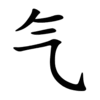气
Translingual
| Traditional | 氣 |
|---|---|
| Shinjitai | 気 |
| Simplified | 气 |
| Stroke order | |||
|---|---|---|---|
| Stroke order | |||
|---|---|---|---|

| |||
Han character
气 (Kangxi radical 84, 气+0, 4 strokes, cangjie input 人一弓 (OMN) or 難人一弓 (XOMN), four-corner 80017, composition ⿳𠂉一⺄)
- Kangxi radical #84, ⽓.
- Shuōwén Jiězì radical №8
Derived characters
- Index:Chinese radical/气
- 㐹, 𠯏, 𡉛, 忾, 㧉, 汽, 𨸛, 𣅠, 䏗, 𣏙, 𪸕, 𤽍, 𥐬, 𥝬, 𥸽, 𥾨, 𫊨, 𧥷, 𧺞, 𨥊, 靔, 𩚤(饩), 𩡹, 𪌇, 㡮, 𪗟, 芞, 𥤶, 𤴸
Related characters
- 氣 (Orthodox traditional form)
References
- Kangxi Dictionary: page 599, character 3
- Dai Kanwa Jiten: character 17043
- Dae Jaweon: page 990, character 14
- Hanyu Da Zidian (first edition): volume 3, page 2010, character 1
- Unihan data for U+6C14
Chinese
Glyph origin
| Historical forms of the character 气 | ||||||
|---|---|---|---|---|---|---|
| Shang | Western Zhou | Spring and Autumn | Warring States | Shuowen Jiezi (compiled in Han) | Liushutong (compiled in Ming) | |
| Oracle bone script | Bronze inscriptions | Bronze inscriptions | Chu slip and silk script | Qin slip script | Small seal script | Transcribed ancient scripts |

|

|

|

|

|

|

|
气 (OC *kʰɯds) is a pictogram (象形) of clouds flowing through the sky. In the oracle bone script, it was represented by three horizontal strokes, expressing the "feeling" of the sky. However, in order to avoid confusion with the number 三 (OC *suːm, *suːms), the current 气 (OC *kʰɯds) was changed to draw a small stroke from top to bottom. The glyph of 氣 (OC *kʰɯds, *qʰɯds) and 乞 (OC *kʰɯds, *kʰɯd) comes from the same ancient form.
Etymology 1
| For pronunciation and definitions of 气 – see 氣 (“gas; air; etc.”). (This character is the simplified and variant form of 氣). |
Notes:
|
Etymology 2
| For pronunciation and definitions of 气 – see 乞 (“to beg; to request; etc.”). (This character is a variant form of 乞). |
Etymology 3
| For pronunciation and definitions of 气 – see 餼 (“foodgrain as a gift; foodgrain; etc.”). (This character is an ancient variant form of 餼). |
References
- Dictionary of Chinese Character Variants (教育部異體字字典), B01998
- Dictionary of Chinese Character Variants (教育部異體字字典), A02115-005#26
- Dictionary of Chinese Character Variants (教育部異體字字典), A00041-002#26
Japanese
Kanji
气
- steam radical (きがまえ (kigamae))
Readings
Usage notes
- This character exists only as a radical in Japanese. The corresponding character is 気 (“air; atmosphere; spirit”).
Vietnamese
Han character
气: Hán Việt readings: khí[1][2]
References
Categories:
- CJKV characters simplified differently in Japan and China
- Han character radicals
- Translingual lemmas
- Translingual symbols
- Han script characters
- Han pictograms
- Elementary Mandarin
- Intermediate Mandarin
- zh:Chemistry
- zh:Matter
- zh:Gases
- zh:Emotions
- zh:Atmosphere
- Chinese lemmas
- Mandarin lemmas
- Sichuanese lemmas
- Dungan lemmas
- Cantonese lemmas
- Taishanese lemmas
- Gan lemmas
- Hakka lemmas
- Jin lemmas
- Northern Min lemmas
- Eastern Min lemmas
- Hokkien lemmas
- Teochew lemmas
- Wu lemmas
- Xiang lemmas
- Chinese nouns
- Mandarin nouns
- Sichuanese nouns
- Dungan nouns
- Cantonese nouns
- Taishanese nouns
- Gan nouns
- Hakka nouns
- Jin nouns
- Northern Min nouns
- Eastern Min nouns
- Hokkien nouns
- Teochew nouns
- Wu nouns
- Xiang nouns
- Chinese verbs
- Mandarin verbs
- Sichuanese verbs
- Dungan verbs
- Cantonese verbs
- Taishanese verbs
- Gan verbs
- Hakka verbs
- Jin verbs
- Northern Min verbs
- Eastern Min verbs
- Hokkien verbs
- Teochew verbs
- Wu verbs
- Xiang verbs
- Chinese proper nouns
- Mandarin proper nouns
- Sichuanese proper nouns
- Dungan proper nouns
- Cantonese proper nouns
- Taishanese proper nouns
- Gan proper nouns
- Hakka proper nouns
- Jin proper nouns
- Northern Min proper nouns
- Eastern Min proper nouns
- Hokkien proper nouns
- Teochew proper nouns
- Wu proper nouns
- Xiang proper nouns
- Chinese terms with IPA pronunciation
- Chinese Han characters
- Chinese simplified forms
- Chinese variant forms
- zh:Grains
- zh:Agriculture
- zh:Foods
- Japanese Han characters
- Uncommon kanji
- Japanese kanji with goon reading け
- Japanese kanji with kan'on reading き
- Japanese kanji with kun reading いき
- Vietnamese Chữ Hán
- Vietnamese lemmas
- Vietnamese Han characters
